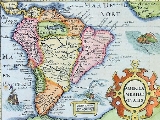Princes and Paupers: Inequality and Underdevelopment in South America
30 Apr 2012
When looking to the past, the contrast between North and South America could hardly be more dramatic. In 1820, the GDP of Latin America was external pageabout 14 percent greatercall_made than that of the United States. Two hundred years later, US GDP external pagemore than doublescall_madethat of the entire region. Even more dramatic, as we explored in February, is the contrast with countries such as China and the ‘Asian Tigers’, which have achieved their prosperity relatively quickly when compared with South American states.
This week we puzzle over why progress (writ large) and the redistribution of power have occurred fitfully and incompletely in South America. We begin today with a critical evaluation of what is widely regarded as THE classic explanation of South American underachievement – Eduardo Galeano’s The Open Veins of Latin America, which claims that the continent’s woes are the legacy of interference and exploitation by its European conquerors and later by the United States.
Moderator Ken Livingston first discusses this argument with Alan Knight, Professor of Latin American History at Oxford University, and with Javier Farje of the Latin America Bureau, a research organization based in London.
Part 1:
[Resource Embedded:141374]
Part 2:
[Resource Embedded:141375]
Since Galeano wrote his groundbreaking text in the 1970s, however, it is important to emphasize that significant progress has been made in Latin America, particularly in terms of social indicators such as infant mortality.
[Resource Embedded:141376]
Unfortunately, improved social indicators have not coincided with improved systemic-level economic growth, as the following graph illustrates:
[Resource Embedded:141378]
Finally, we close with a different “take” by Christopher Sabatini, from Foreign Affairs magazine. He argues that poverty, inequality and under-development are rapidly becoming the wrong stories to tell about South America in the 21st century. Progress is indeed being made.
[Resource Embedded:141380]
Additional Resources
University of Chicago, The False Promise of Populism in Latin America
external pagehttp://www.youtube.com/watch?v=iNhOLcmnhPU&feature=relmfucall_made
Boston University, The Past and Future of Latin America
external pagehttp://www.youtube.com/watch?v=AxBzbu5shXAcall_made
How South America Stopped Listening to the U.S. and Started Prospering
external pagehttp://www.youtube.com/watch?v=ShFH9cu5z7scall_made
University of Chicago, Poverty and Growth: Reflections on Latin America - Growth, Poverty, and Economic Development
external pagehttp://www.youtube.com/watch?v=_WKNmk2LxVA&feature=relatedcall_made
University of Chicago, The Weakness of the State in Latin America
external pagehttp://www.youtube.com/watch?v=7Z_lg-wbFpw&feature=relmfucall_made

